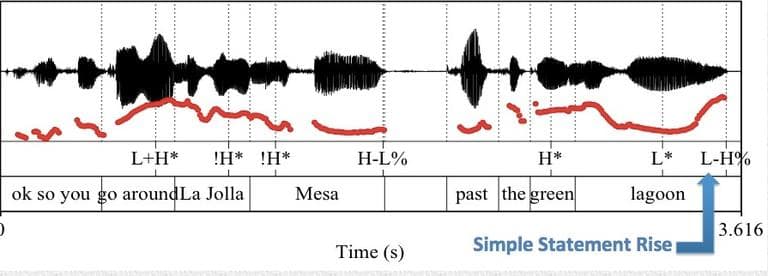Advertisement
Uptalk? Linguists Say It's Not Just For So Cal 'Valley Girls' Anymore?

This is a simple declarative sentence but I'm ending it with a question mark? My aim is to remind all of us who don't live in Southern California what the intonation there may sound like to us? And it might also be a good idea to get used to it, because new research suggests that it's not just for Valley Girls anymore?
Okay, you're ready to kill me and I can't stand it anymore anyway. But here's the point made by linguistic researchers at the Acoustical Society of America meeting now under way in San Francisco: Uptalk appears to be on the rise, to the point that it's exceedingly widespread in both genders among young Southern Californians who speak what we could call So Cal English.
Amanda Ritchart, a linguistics graduate student at the University of California at San Diego, recorded two dozen college-age southern Californians, about half male and half female, from different ethnic and economic backgrounds, and analyzed their speech as they performed a couple of tasks: giving instructions on a map and retelling what happened in a video clip.
She found that all of them used uptalk, though the women did it more than the men.
The implications: Uptalk is looking more and more like part of a widespread Southern Californian dialect. To avoid misunderstandings, it may be wise to accept that. Amanda Ritchart, who admits to some uptalking herself, says that when Southern Californians speak to outsiders, they may "come across as ditzy or stupid or maybe unassertive or timid or something." But, she says, "Because everyone does it, obviously that’s not true. And that’s why it kind of helps to break those stereotypes. We’re not confused. We’re not stupid. We just talk like that."
Ritchart's research also identified a clear difference in tone between when a So Cal English speaker asks a question or makes a statement, even though both have a rise at the end. The rise in a statement comes later than the rise for a question. Though you might not catch that as an outsider, its clear to another uptalker.
And by the way, you standard English snobs, people who do not use uptalk can come across as somewhat unfriendly or rude to Southern Californians. And for So Cal English speakers, uptalk simply sounds polite — to the point that Ritchart says that when she’s at a coffee shop and the barista asks what name to put on her order, she says “Amanda?” Obviously not because she’s questioning her own name — she’s just speaking her native dialect.
From the press release:
The results showed that uptalk is a part of southern California English that transcends gender boundaries, and several other boundaries as well.
"Our sample only included undergraduate students ages 18-22, so we cannot say anything definitive about older southern Californians," Ritchart said. "But we found use of uptalk in all of our speakers, despite their diverse backgrounds in socioeconomic status, ethnicity, bilingualism and gender."
A major confusion for outsiders is whether it is possible to distinguish between "uptalked" statements and normal questions, but Ritchart's work identified a systematic pitch difference between the two: when the rise was used for a simple statement, it began significantly later in the utterance than when the rise was used for asking a question. However, said co-author and professor Amalia Arvaniti, this difference is so subtle that non-uptalkers typically miss it and assume a question is being asked when a statement is being given.
"Our study busts the stereotype associated with uptalk that those who speak uptalk actually ask questions instead of make statements, a tendency that is supposed to be linked to insecurity," Arvaniti said. "But native southern California speakers know the difference based on the exact location of the rise start, and the extent to which pitch changes in the rise."
A goal of the research, the authors said, is to fully understand this dialect development and what it means for global communication – or miscommunication. "Imagine a teacher from the American Midwest moving to California and hearing students give a presentation using uptalk," Arvaniti said. "To the Midwesterner, the southern California speakers may sound tentative or even ditzy." Conversely, the lack of uptalk from their teacher may seem unfriendly to the students, thus impairing relationships and communication, she said.
The researchers say that as its use expands, greater awareness of the subtleties of uptalk will likely be an important part of achieving clearer global communication in many professions.
Global communication indeed: Linguists have also studied uptalk in England, Australia and New Zealand.
Readers? Can you accept uptalk as a dialect? Do you use it yourself? Or are you one of the listeners who phone public radio stations whenever you hear it to complain that it's abhorrent?
This program aired on December 4, 2013. The audio for this program is not available.
